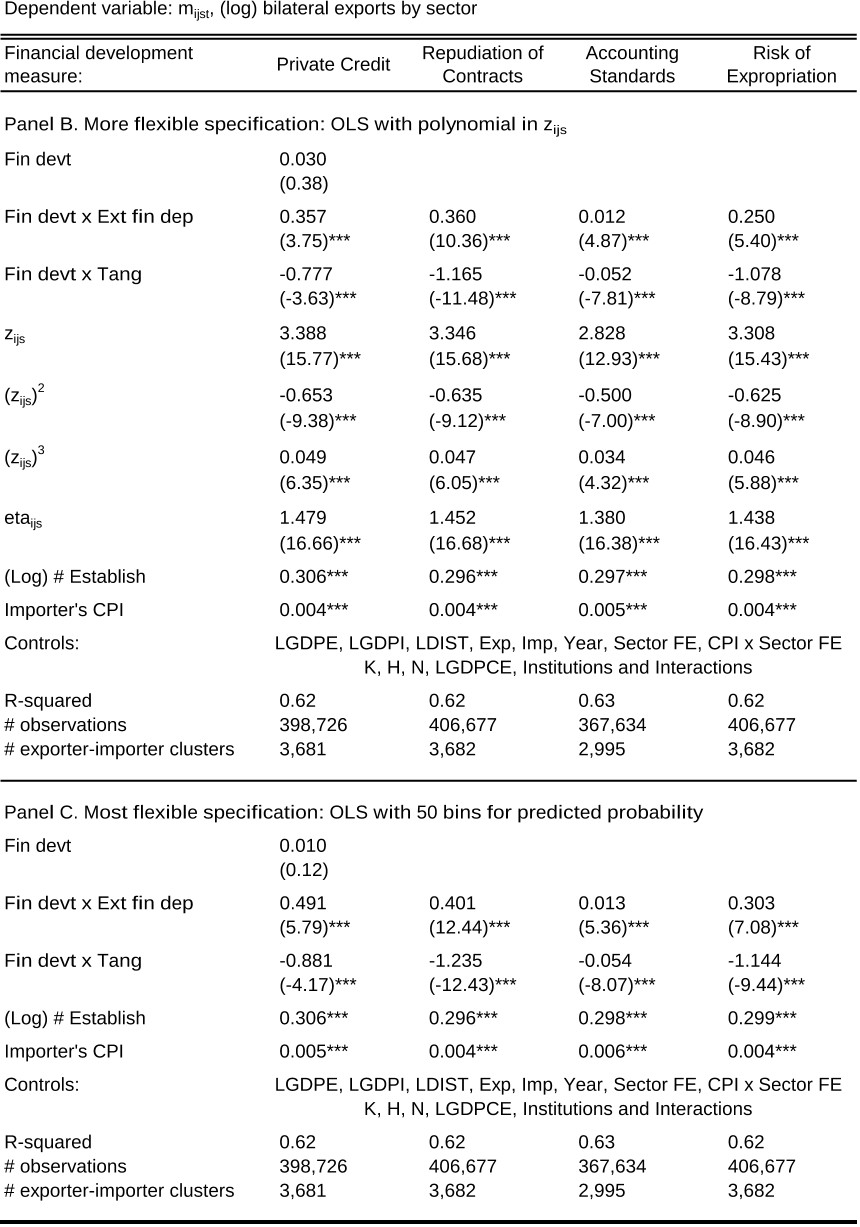Credit Constraints, Heterogeneous Firms and International Trade
Reads0
Chats0
TLDR
This article examined the detrimental consequences of financial market imperfections for international trade and developed a heterogeneous-firm model with countries at different levels of financial development and sectors of varying financial vulnerability.Abstract:
This paper examines the detrimental consequences of financial market imperfections for international trade. I develop a heterogeneous-firm model with countries at different levels of financial development and sectors of varying financial vulnerability. Applying this model to aggregate trade data, I study the mechanisms through which credit constraints operate. First, financial development increases countries' exports above and beyond its impact on overall production. Firm selection into exporting accounts for a third of the trade-specific effect, while two thirds are due to reductions in firm-level exports. Second, financially advanced economies export a wider range of products and their exports experience less product turnover. Finally, while all countries service large destinations, exporters with superior financial institutions have more trading partners and also enter smaller markets. All of these effects are magnified in financially vulnerable sectors. These results have important policy implications for less developed economies that rely on exports for economic growth but suffer from poor financial contractibility.read more
Figures

Table 10. Economic Significance: Predicted vs. Actual Trade Growth 
Table 9. Economic Significance: Comparative Statics 
Table 5. Financial Development and Firm-Level Exports 
Figure 3. The Productivity Cut-off for Exporting 
Table 5. Financial Development and Firm-Level Exports 
Table 1. Export Patterns in the Data
Citations
More filters
Effects of Financial Soundness on Export Activities: Evidence from Firm-Level Data of Korea
Yeonjin Shin,Jung Hur +1 more
TL;DR: In this article , the authors examined the effects of financial soundness on various export activities of manufacturing firms in South Korea and found that the financial strength plays a self-selection role in increasing numbers of export firms in manufacturing sectors.
Journal ArticleDOI
How did export activity affect small business access to bank capitals during the global crisis
Ramzi Benkraiem,Anthony Miloudi +1 more
TL;DR: In this article, the authors studied the effect of export activity, viewed as a way of estimating small business internationalization, on access to bank capitals during the recent global crisis and found that the existence and intensity of exports are negatively related to bank capital, demonstrating the difficulties of small businesses to rely on financial leverage when they wish to explore new markets.
Journal ArticleDOI
Dampen macroeconomic volatility: a useful role of capital controls on international trade
TL;DR: In this paper , the authors demonstrate the usefulness of capital controls for reducing macroeconomic volatilities and then mitigating their negative effects on international trade by using a dynamic panel approach to a sample of 26 countries over the period 2010-2020.
Journal ArticleDOI
Effects of Capital Control Actions on Cross-Border Trade
TL;DR: In this paper , the effect of capital controls on cross-border trade has been investigated in 25 emerging countries over the period 2011-2019 and the results show that the long-lasting capital controls are more effective than short-lasting controls.
The impact of credit constraint on exporting and innovation: Evidence from Ghana and Vietnam
TL;DR: In this article, a survey of Vietnamese small and medium enterprises was conducted to evaluate the acceptance of Pap smear screening compared to self-collected HPV testing in low-income women in North Carolina.
References
More filters
Posted Content
Law and Finance
Rafael La Porta,Rafael La Porta,Florencio Lopez de Silanes,Florencio Lopez de Silanes,Andrei Shleifer,Andrei Shleifer,Robert W. Vishny,Robert W. Vishny +7 more
TL;DR: This paper examined legal rules covering protection of corporate shareholders and creditors, the origin of these rules, and the quality of their enforcement in 49 countries and found that common law countries generally have the best, and French civil law countries the worst, legal protections of investors.
Journal ArticleDOI
Law and Finance
TL;DR: In this article, the authors examined legal rules covering protection of corporate shareholders and creditors, the origin of these rules, and the quality of their enforcement in 49 countries and found that common-law countries generally have the strongest, and French civil law countries the weakest, legal protections of investors, with German- and Scandinavian-civil law countries located in the middle.
Journal ArticleDOI
The Impact of Trade on Intra-Industry Reallocations and Aggregate Industry Productivity
TL;DR: This paper developed a dynamic industry model with heterogeneous firms to analyze the intra-industry effects of international trade and showed how the exposure to trade will induce only the more productive firms to enter the export market (while some less productive firms continue to produce only for the domestic market).
Journal ArticleDOI
Finance and Growth: Schumpeter Might Be Right
TL;DR: In this paper, the authors examined a cross-section of about 80 countries for the period 1960-89 and found that various measures of financial development are strongly associated with both current and later rates of economic growth.
ReportDOI
Financial Dependence and Growth
Raghuram G. Rajan,Raghuram G. Rajan,Raghuram G. Rajan,Luigi Zingales,Luigi Zingales,Luigi Zingales +5 more
TL;DR: This paper examined whether financial development facilitates economic growth by scrutinizing one rationale for such a relationship; that financial development reduces the costs of external finance to firms, and found that industrial sectors that are relatively more in need of foreign finance develop disproportionately faster in countries with more developed financial markets.